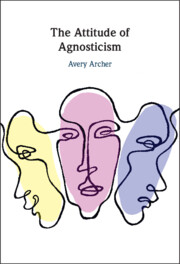Refine search
Actions for selected content:
3 results
Chapter 1 - Introduction
-
- Book:
- The Attitude of Agnosticism
- Published online:
- 14 March 2024
- Print publication:
- 21 March 2024, pp 1-5
-
- Chapter
- Export citation
Chapter 3 - Competing Attitudinal Accounts of Agnosticism
-
- Book:
- The Attitude of Agnosticism
- Published online:
- 14 March 2024
- Print publication:
- 21 March 2024, pp 41-58
-
- Chapter
- Export citation

The Attitude of Agnosticism
-
- Published online:
- 14 March 2024
- Print publication:
- 21 March 2024
